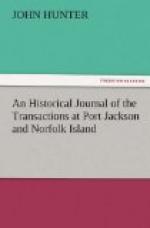Most providentially, we had a succession of the finest weather and the fairest winds we could have wished, from the time we left the streights of Sunda until our arrival at the Isle of France; and another great consolation was, that the vessel was perfectly tight.
From the direction of the wind being at south-east, all vessels going to the north-west harbour, must luff close round the gunner’s quoin, and haul over for the island, taking care to avoid the reefs with which the shore is lined, and on which the surf breaks with great violence. A continuation of forts and batteries extend from the harbour’s mouth as far as it is possible for any vessel to fetch; though, independent of these forts, landing here must be attended with much danger, from the constant surf which breaks on the reefs already mentioned; and as the wind always blows out of the harbour, every vessel is obliged to warp in. No vessel ought to touch at this island during the hurricane months*, as the harbour cannot afford shelter for more than six or eight vessels. In 1788, six large ships were wrecked in this harbour.
[* October, November, and December.]
At this time there were lying in the harbour, La Thetis, of 38 guns, commanded by Compte M’Namarra, Chef de Division; La Nymphe, 38 guns, Le Compte de Forineaux, Chef de Division; La Medusa, 38 guns, Le Compte de Rossilly; three American vessels, and a great number of French merchant ships.
The revolution of this island, which had taken place about three weeks before our arrival, was attended with great excesses by the people, who carried Le Compte M’Namarra to the gallows, where he was near being executed. The governor, Le Compte de Conway, had resigned his government to a Monsieur De Caussigny, commandant of Bourbon, who arrived here only three days before us. Monsieur de Conway waited the equipment of La Nymphe frigate, in which ship he proposed returning to France.
The town of Port Louis is large, and covers a deal of ground, but the houses are in general paltry buildings. Here are large stores, and every thing necessary for the equipment of fleets. The number of inhabitants on the island, exclusive of the military, is about 8000; and blacks, 12,000.
Fresh provisions, especially butchers meat, are very scarce here; what there is costs 20 sous per pound; but turtle is procured from St. Branden, and sold at a much cheaper rate.
The general object of cultivation on this island is the indico, of which from four to five crops a year are procured: one person sent to Europe 30,000 lb. in 1789, of a very superior quality. Attempts have been made here to rear cochineal, as the island abounds with the plant which the insects lie on, but a small bird destroys the insect. The soil of this island is little superior to that at Port Jackson. At the distance of three leagues from the port, is le gardin du Roi, which is kept with the utmost care: a gardener lives here at the King’s expence, who rears the plants, and distributes them, gratis, to the colonists. This year the following plants were to be distributed to those who chose to ask for them.




